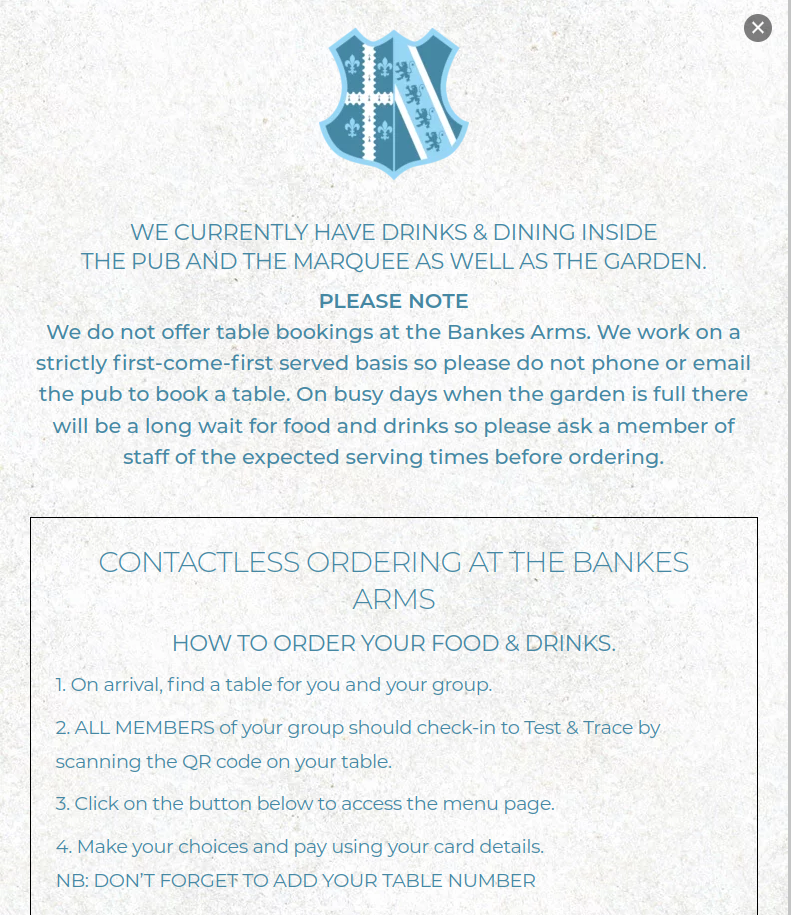47 years ago, I started my house jobs in Poole General Hospital, and discovered one of the most beautiful landscapes in the world in the Isle of Purbeck, to me previously only the subject of maps on coastal erosion in physical geography at school.

I was on call 112 hours a week, but when there was time off we escaped with Scruffy the bearded collie, our favourite walk being out to Old Harry rocks from Studland, and back for a pub lunch at the Bankes Arms. It became the nearest thing to our “local” for the 14 months I worked in Dorset, meals being outside in the garden overlooking the sea in the summer, and inside the cosy old pub in the winter. We took family there when they visited.
Purbeck, and the Bankes Arms, kept drawing us back over the years: we took our baby son there before he could walk (he didn’t sample the local Fossil bitter), and we rented cottages nearby on several occasions. My wife took her aged father there when they stayed in Swanage, and I, likewise, took my mother on holiday there as she began to develop dementia, after my father died. And our grown up children succumbed to its delights as we introduced them to the area. The Bankes Arms has been an iconic part of my life for half a century.
So yesterday, being freed up for travel by the death of our old black Labrador, and finally recovered from persistent colds, we drove over for the day and revisited the old haunts. Despite its being mid-September, the walk out to Old Harry was more crowded than it used to be, but I suppose one can’t complain that folks denied trips abroad should seek recreation at home. But it is still a bit weird how about half those one sees enjoying the wild outdoors are clutching, or contemplating, their iPhones, the internet appearing to be their real world and nature just a rather lifelike projection.
So, with a healthy appetite engendered by sun, sea and sky we repaired to the Bankes Arms to find this (this exact version was captured at home from the website):
You’ll see that in order to access the menu, you have to connect from a smart-phone; in order to sit down you have to provide your identity via the Test and Trace app on a smart-phone (though there is no longer a legal requirement to do so); in order to order you must use the smart-phone, and in order to pay you must likewise do so online. I should add that on the door of the pub itself was a large notice warning people not to go inside to order food from the bar. It has become a private public house, accessed only electonically.
I caught the attention of a young mid-European waiter carrying a tray outside (one or two haven’t gone home, it seems), and asked if there was any way to order food without a smart-phone, since I don’t possess one and don’t want to. The answer was “No.” They lost our custom, of course, but probably don’t care, given the large numbers of permanently-connected trippers milling around the coastline.
Now, in mitigation, perhaps, other notices apologised about staff shortages, which are as universal in Britain as they are in the USA for reasons that have more to do with COVID policy than Brexit, I think. So maybe they would argue that this automated regime is necessary to keep open at all. I doubt it, though – there was an air of permanancy, of “the next phase”,” about the whole thing, not least in that the management seemed oblivious to the very existence of the non-technical elderly (of whom there were many given it was mid-week in autumn), of those too poor to fork out several hundred quid for a gadget, of those who had left their gadgets at home to experience God’s real world for a bit – and of those who, like us, have read Edward Snowden and are not particularly keen on furthering the cause of universal digital identities and the abolition of untraceable cash transactions.
Eventually, we found some food at another of our old haunts, the Scotts Arms at Kingston (with wonderful views overlooking a distant Corfe Castle). They too had staff shortages, and consequently a more limited menu than we remember, and they had annoying piles of chairs blocking off the bar except where two staff were taking orders, and refused to take cash. But at least we managed to eat like free citizens instead of being discriminated against for lacking the right tracking device.
I’m glad to say my wife and I are very much on the same page regarding the world’s trajectory towards servitude. Interestingly, whilst I pore over long form discussions and research papers on the internet (but only from my desk, not when I’m eating out, unlike the teenage children of the family… and the young adults, come to that), she still gets all her news from the BBC, but has become adept at recognising the slants and omissions of the propaganda. “The government obviously has an end-point in view,” she said to me over our crispy chickenburgers.
What that end point is one might discuss, though whenever it is discussed more or less the same conclusions appear to be reached, largely because it is so openly announced on the official websites of the ruling elite. But in case you think we’re being paranoid about the increasing trend, even before vaccine passports, of requiring online recognition even to buy a pie and a pint, then look at this article.
Already, the NHS app – which, remember, is marketed as giving you the useful ability to access your own health record (funny that – my body tells me all I actually need of my health record) – is not only being used by private firms to control access to their products, but is sharing that information, without consent, with the State’s law-enforcement agencies. Now the Bankes Arms is not (yet) discriminating against customers based on their vaccine status, but it is discriminating based on lack of access to the NHS app, and on non-possession of a smart-phone.
If and when that total dependence on internet access becomes the norm for shops, as well as restaurants, pubs, sporting venues, admission to historical monuments or zoos, and car parks (one of the machines in the National Trust car park at Studland was refusing to take coins – how long before that becomes policy and one can only get a ticket online?), then logic will dictate that carrying around a phone is both inconvenient and insecure. How much better to have a chip permanently under the skin that can give you access to services either directly, or from a locally-accessed terminal?
“To order, simply pass your chip over the screen on the table, to access the menu and payment.”
“National Trust Old Harry Rocks nature trail – free entry. Just check in at the turnstile to enter.”
Edward Snowden found this trend by direct experience of the security services nearly a decade ago now, and warns increasingly urgently now that AI technology and policy have moved on. The State can already know know all your movements, everything you buy, the political slant of your news-gathering, everything you say and everyone you meet, and your medical status, and it will be able to allocate your social credit score and limit access to everything on an individual basis, where it deems you might put others at medical, moral or intellectual risk. Preventing misinformation on the web, once absolutely everything is accessed on the web, impacts you if you are designated as the “misinformation.”
Of course, if you have nothing to hide, you have nothing to fear. Naturally, you can trust the State to decide, on a day-to-day basis, whether what is no longer hidden from them ought to make you fearful. Once your whole life is on permanent record, there’s plenty of material to build whatever narrative is desired.


How lucky you are to have such a wife! Most men don’t, and would simply fall in line with the collective narrative, for marital peace’s sake.
Levi – Don’t I know it!